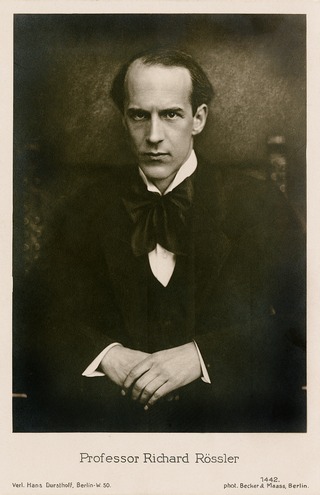Related Research Articles

Isang Yun, or Yun I-sang, was a Korean-born composer who made his later career in West Germany.
Harald Genzmer was a German composer of classical music and an academic.
Johannes Wolfgang Zender was a German conductor and composer. He was the chief conductor of several opera houses, and his compositions, many of them vocal music, have been performed at international festivals.

Beat Furrer is a Swiss-born Austrian composer and conductor. He has served as professor of composition at the University of Music and Performing Arts Graz since 1991. He was awarded the Ernst von Siemens Music Prize in 2018.

Bernhard Lang is an Austrian composer, improviser and programmer of musical patches and applications. His work can be described as contemporary classical, with roots, however, in various genres such as 20th-century avant-garde, European classical music, jazz, free jazz, rock, punk, techno, EDM, electronica, electronic music, and computer-generated music. His works range from solo pieces and chamber music to large ensemble pieces and works for orchestra and musical theatre. Besides music for concert halls, Lang designs sound and music for theatre, dance, film and sound installations.
Rebecca Saunders is a London-born composer who lives and works freelance in Berlin. In a 2017 Classic Voice poll of the greatest works of art music since 2000, Saunders' compositions received the third highest total number of votes (30), surpassed only by the works of Georg Friedrich Haas (49) and Simon Steen-Andersen (35). In 2019, writers of The Guardian ranked Skin (2016) the 16th greatest work of art music since 2000, with Tom Service writing that "Saunders burrows into the interior world of the instruments, and inside the grain of Fraser's voice [...] and finds a revelatory world of heightened feeling."

Gestural Variations, Op. 43, is a trio composition by Graham Waterhouse in 1997 originally for oboe, bassoon and piano. Later versions are scored for clarinet, cello and piano (1999) and flute, cello and piano (2009).
Margrit Zimmermann was a Swiss pianist, composer, conductor and music educator.
Jens Josef is a German composer of classical music, a flutist and academic teacher.
Enno Poppe is a German composer and conductor of classical music, and an academic teacher.
Jörg Duda is a German composer of classical music.

Hermann Zilcher was a German composer, pianist, conductor, and music teacher. His compositional oeuvre includes orchestral and choral works, two operas, chamber music and songs, études, piano works, and numerous works for accordion.

Gerhard Präsent is an Austrian composer, conductor and academic teacher.

Karola Obermueller is a German composer and teacher.
Siegfried Köhler was a German composer in the German Democratic Republic.
Margarita Höhenrieder is a German classical pianist and a professor at the Hochschule für Musik und Theater München. She has performed internationally and recorded, with a focus on chamber music. She premiered compositions which Harald Genzmer dedicated to her.

Friedrich Schenker was a German avant-garde composer and trombone player.
Juliane Klein is a German composer and publishing director.
Wilhelm Stross was a German violinist and composer. He was professor at the Hochschule für Musik und Theater München and the Hochschule für Musik und Tanz Köln as well as first violin of the Stross Quartet.

Richard Rössler, also Roessler or Rößler was a Baltic German pianist, organist, composer and music educator. In 1910, he married the pianist Dora Charlotte Mayer (1887–1951), a Württemberg pastor's daughter who had studied in Berlin with Ernst von Dohnányi and Max Bruch. The couple had three children.
References
- 1 2 3 "Rudi Spring (born 1962)". vierdreiunddreissig. Retrieved 29 November 2010.
- ↑ "Interview Rudi Spring / Auf eine existentielle Musik hin" (in German). musikmph.de. 1 January 1998. Archived from the original on 14 March 2012. Retrieved 9 September 2011.
- ↑ "Rudi Spring (*1962) / Verzeichnis sämtlicher Kompositionen und Bearbeitungen (1979 bis 2009)" (PDF) (in German). Rudi Spring. 2009. Retrieved 5 December 2011.
- ↑ "Stipendiaten der Villa Massimo 2005". Villa Massimo. 2005. Archived from the original on 16 July 2011. Retrieved 29 November 2010.
- 1 2 3 "Salomix-max – Voice Without Limits / Salome Kammer". arkivmusic.com. 2008. Retrieved 29 November 2010.
- ↑ Daniel Honsack (24 July 2009). "Ganz besondere Heimatlieder / RMF Salome Kammer und Rudi Spring im Parkhotel Schlangenbad" (in German). Wiesbadener Tagblatt. Retrieved 30 November 2010.
- ↑ "Konzertante Musik für Flöte – Cello – Klavier" (in German). Graham Waterhouse. 20 December 2009. Retrieved 30 November 2010.